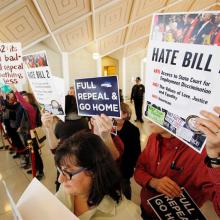bruce springsteen
A deal has fallen apart to undo the North Carolina law known as the “bathroom bill,” in a sign of the state’s bitter political divide.
The state’s legislature was called into a special session on Dec. 21, to consider repealing the law known as HB2 after months of pressure, including lost jobs and canceled sporting events and concerts.
IT WAS THE first week of November 2012, and Bruce Springsteen was busy helping nail down a few swing states for President Obama. In the process, he expressed more enthusiasm than I could ever muster for the man who put Tim "The Fox" Geithner in charge of our financial hen house. But political quibbles aside, I remain convinced that what Springsteen actually does for a living is more important to the life of our country than the work of any living politician, and I saw living proof that very same week.
On the Saturday night before Election Day, Springsteen and his E Street Band dropped into Louisville, Ky. Of course, my wife, Polly, and I had to go, and we had to take our 12-year-old son, Joseph, who has become the fourth Springsteen-obsessed member of our family. It was my fifth time to see the show, and ever since I've been thinking of the poem in which Allen Ginsberg asked America, "When will you be worthy of your million Trotskyites?" Paraphrasing Ginsberg, I ask today, "America, when will you be worthy of your E Street Band?"
To me, going to see the E Street Band has become something like going to see a natural wonder, like Yellowstone or Mammoth Cave or, more to the point, the California redwood forests: Like the redwoods, it's growing older. The bark gets rougher by the decade, and some branches break off and fall to the earth. But Springsteen's great tree of American music is still growing in stature and substance. The band has become a cultural institution that spans races, genders, and generations and fittingly represents the sacred American musical tradition that has grown from the work songs, ring shouts, and spirituals of the slaves.
Bruce Springsteen surprises memorial concertgoers in Oslo with a performance of "We Shall Overcome" --- Banksy's controversial Olympic art raises questions in London --- Lord Voldemort's Super PAC --- Ben Gibbard sings ode to ex-Mariners right fielder, Ichrio --- Saturday Night Live plans presidential election specials. See these and more in today's Links of Awesomeness...
Watch the new trailer for the Monsters, Inc. prequel, Monsters University. Plus a man with no legs climbs Mt. Kilimanjaro and CNN streams a new documentary on Bruce Springsteen. Read these in today's Links of Awesomeness...
IN THE GREAT gospel and blues tradition of affirming in the negative, Bruce Springsteen’s new album, Wrecking Ball, is simultaneously a ferocious roar of righteous anger at what the captains of Wall Street did to America in 2008 and a riotous celebration of American roots. That could make it the perfect soundtrack for a spring and summer resurgence of the Occupy Wall Street campaign.
At this point a new album from Bruce Springsteen is no longer an earth-shaking event, even in the world of rock and roll. After all, the guy is 62. In the past few years, two core members of his band (organist Danny Federici and sax man Clarence Clemons) have died, not from rock-star excesses but from the old-guy ailments of skin cancer and stroke, respectively. And The Boss’ last album of new material, the 2009 Working on a Dream, was definitely subpar.
But with Wrecking Ball, Spring-steen has, for the second time within a decade, stepped forward to assume the role of a Telecaster-toting poet laureate and produced a stirring work of popular art that speaks to the depths of the national condition. The first time was with The Rising, his 2002 meditation on mortality and loss in response to 9/11. The songs in this new collection plainly declare about our ongoing economic crisis what no mainstream national political leader has been willing to say: We were robbed, and the thieves have escaped justice.
Ten years on, I'm remembering the literature I read and the music that kept me going in the days and months after 9/11. I had Rumi and Whitman on my bedside table, reading them back to back, alternating between selections of the Mathnawi and poems from Leaves of Grass, sometimes feeling like the two were one, the soul of America, and that the soul of Islam were intersecting at some point beyond where the eye could see:
Whoever you are!, motion and reflection are especially for you, The divine ship sails the divine sea for you. -- Walt Whitman
Come, come, whoever you are, Wanderer, worshipper, lover of leaving, Ours is not a caravan of despair. Even if you have broken your vows a thousand times It doesn't matter Come, come yet again, come. -- Rumi
Until then, the Quran for me was a book of personal spiritual guidance, a convening symbol for my religious community. But after 9/11, I viewed it as a balm for my country's pain, especially lines from Ayat al-Kursi: "His throne extends over the heavens and the earth, and He feels no fatigue in guarding and preserving them."
After the great revival of conscience-laden rock events in 1985, it might seem today that the search for good times and the common good must again be carried out at the margins.


